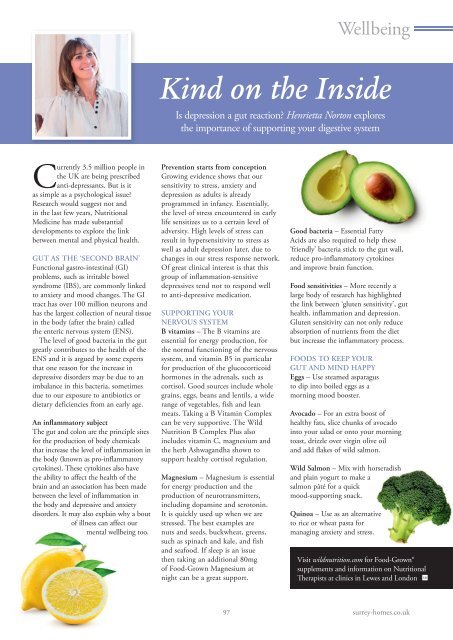Surrey Homes | SH64 | February 2020 | Interiors supplement inside
The lifestyle magazine for Surrey - Inspirational Interiors, Fabulous Fashion, Delicious Dishes
The lifestyle magazine for Surrey - Inspirational Interiors, Fabulous Fashion, Delicious Dishes
You also want an ePaper? Increase the reach of your titles
YUMPU automatically turns print PDFs into web optimized ePapers that Google loves.
Wellbeing<br />
Kind on the Inside<br />
Is depression a gut reaction? Henrietta Norton explores<br />
the importance of supporting your digestive system<br />
Currently 3.5 million people in<br />
the UK are being prescribed<br />
anti-depressants. But is it<br />
as simple as a psychological issue?<br />
Research would suggest not and<br />
in the last few years, Nutritional<br />
Medicine has made substantial<br />
developments to explore the link<br />
between mental and physical health.<br />
GUT AS THE ‘SECOND BRAIN’<br />
Functional gastro-intestinal (GI)<br />
problems, such as irritable bowel<br />
syndrome (IBS), are commonly linked<br />
to anxiety and mood changes. The GI<br />
tract has over 100 million neurons and<br />
has the largest collection of neural tissue<br />
in the body (after the brain) called<br />
the enteric nervous system (ENS).<br />
The level of good bacteria in the gut<br />
greatly contributes to the health of the<br />
ENS and it is argued by some experts<br />
that one reason for the increase in<br />
depressive disorders may be due to an<br />
imbalance in this bacteria, sometimes<br />
due to our exposure to antibiotics or<br />
dietary deficiencies from an early age.<br />
An inflammatory subject<br />
The gut and colon are the principle sites<br />
for the production of body chemicals<br />
that increase the level of inflammation in<br />
the body (known as pro-inflammatory<br />
cytokines). These cytokines also have<br />
the ability to affect the health of the<br />
brain and an association has been made<br />
between the level of inflammation in<br />
the body and depressive and anxiety<br />
disorders. It may also explain why a bout<br />
of illness can affect our<br />
mental wellbeing too.<br />
Prevention starts from conception<br />
Growing evidence shows that our<br />
sensitivity to stress, anxiety and<br />
depression as adults is already<br />
programmed in infancy. Essentially,<br />
the level of stress encountered in early<br />
life sensitizes us to a certain level of<br />
adversity. High levels of stress can<br />
result in hypersensitivity to stress as<br />
well as adult depression later, due to<br />
changes in our stress response network.<br />
Of great clinical interest is that this<br />
group of inflammation-sensitive<br />
depressives tend not to respond well<br />
to anti-depressive medication.<br />
SUPPORTING YOUR<br />
NERVOUS SYSTEM<br />
B vitamins – The B vitamins are<br />
essential for energy production, for<br />
the normal functioning of the nervous<br />
system, and vitamin B5 in particular<br />
for production of the glucocorticoid<br />
hormones in the adrenals, such as<br />
cortisol. Good sources include whole<br />
grains, eggs, beans and lentils, a wide<br />
range of vegetables, fish and lean<br />
meats. Taking a B Vitamin Complex<br />
can be very supportive. The Wild<br />
Nutrition B Complex Plus also<br />
includes vitamin C, magnesium and<br />
the herb Ashwagandha shown to<br />
support healthy cortisol regulation.<br />
Magnesium – Magnesium is essential<br />
for energy production and the<br />
production of neurotransmitters,<br />
including dopamine and serotonin.<br />
It is quickly used up when we are<br />
stressed. The best examples are<br />
nuts and seeds, buckwheat, greens,<br />
such as spinach and kale, and fish<br />
and seafood. If sleep is an issue<br />
then taking an additional 80mg<br />
of Food-Grown Magnesium at<br />
night can be a great support.<br />
Good bacteria – Essential Fatty<br />
Acids are also required to help these<br />
‘friendly’ bacteria stick to the gut wall,<br />
reduce pro-inflammatory cytokines<br />
and improve brain function.<br />
Food sensitivities – More recently a<br />
large body of research has highlighted<br />
the link between ‘gluten sensitivity’, gut<br />
health, inflammation and depression.<br />
Gluten sensitivity can not only reduce<br />
absorption of nutrients from the diet<br />
but increase the inflammatory process.<br />
FOODS TO KEEP YOUR<br />
GUT AND MIND HAPPY<br />
Eggs – Use steamed asparagus<br />
to dip into boiled eggs as a<br />
morning mood booster.<br />
Avocado – For an extra boost of<br />
healthy fats, slice chunks of avocado<br />
into your salad or onto your morning<br />
toast, drizzle over virgin olive oil<br />
and add flakes of wild salmon.<br />
Wild Salmon – Mix with horseradish<br />
and plain yogurt to make a<br />
salmon pâté for a quick<br />
mood-supporting snack.<br />
Quinoa – Use as an alternative<br />
to rice or wheat pasta for<br />
managing anxiety and stress.<br />
Visit wildnutrition.com for Food-Grown®<br />
<strong>supplement</strong>s and information on Nutritional<br />
Therapists at clinics in Lewes and London<br />
97 surrey-homes.co.uk


















